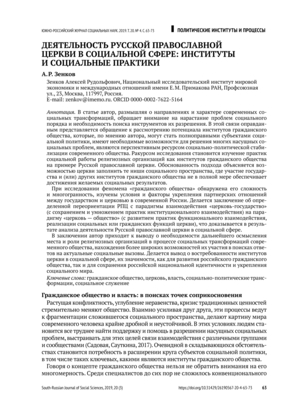Abstract
In the article, the author, reflecting on the directions and nature of modern social transformations, draws attention to the growing problems of social order and the need to find tools to solve them. In this regard, it seems justified to address the potential of civil society institutions, which, according to the author, can become full subjects of social policy, have the necessary capabilities to solve many pressing social problems, are a promising resource for socio-political stabilization of modern society. The research perspective is the study of the practices of social work of religious organizations as civil society institutions on the example of the Russian Orthodox Church. The validity of the approach is explained by the possibility of the Church to fill those niches of social space where the participation of the state and (or) other civil society institutions does not fully ensure the achievement of the desired social results. The study of the phenomenon of "civil society" revealed its complexity and versatility, studied the conditions and factors of strengthening the partnership between the state and the Church in modern Russia. The conclusion is made about a certain reorientation of the ROC from the paradigm of interaction "Church-state "(with preservation and multiplication of practices of institutional interaction) to the paradigm "Church-society" (with the development of practices of functional interaction, the implementation of social or civil functions of the Church), which is proved by the analysis of the activities of the Russian Orthodox Church in the social sphere. In conclusion, the author underlines the importance of the further understanding of the place and role of religious organizations in the process of social transformations of modern society, finding greater opportunities for their participation in the search for answers to current social challenges. It is concluded that the Church institutions are in demand in the social sphere, their importance both for the development of Russian civil society and for the preservation of Russian national identity and strengthening of social peace.
Keywords
References
- Berger, J. (2003). Religious Nongovernmental Organizations: An Exploratory Analysis. Voluntas: International Journal of Voluntary and Nonprofit Organizations, 14, 15–39. DOI: https://doi.org/10.1023/A:1022988804887.
- Chernega, K. (2018). O formakh i pravilakh gospodderzhki NKO otnosiashchikhsia k religioznym organizatsiiam [On the Forms and Rules of Government Support for Socially-Oriented Religious NGOs]. Zhurnal Moskovskoi Patriarkhii [The Journal of the Moscow Patriarchate], 7, 69–71.
- Cladis, M. (2017). Solidarity, Religion, and the Environment: Challenges and Promises in the 21st Century. Changing Societies & Personalities, 1, 353–372. DOI: https://doi.org/10.15826/csp.2017.1.4.023.
- Clarke, G. (2006). Faith Matters: Faith-Based Organizations, Civil Society and International Development. Journal of International Development, 18, 835–848. DOI: https://doi.org/10.1002/jid.1317.
- Cnaan, R., Zrinščak, S., Grönlund, H. et al. (2016). Volunteering in Religious Congregations and Faith-Based Associations. In The Palgrave Handbook of Volunteering, Civic Participation, and Nonprofit Associations. Palgrave Macmillan, London.
- Crisp, B. R. (2014). Social Work and Faith-based Organizations. London: Routledge.
- Edelman Trust Barometer (2019). Executive summary. The 19th Annual Trust and Credibility Survey. Retrieved from https://www.edelman.com/sites/g/files/aatuss191/files/2019–02/2019_Edelman_Trust_Barometer_Executive_Summary.pdf
- Herbert, D. (2003). Religion and Civil Society: Rethinking Public Religion in the Contemporary World. Ashgate Religion Culture and Society. England: Ashgate Religion, Culture & Society Series.
- Ivanova, T. Yu. (2000), Politicheskaia kul'tura naseleniia kak uslovie sushchestvovaniia grazhdanskogo obshchestva [Political Culture of the Population as Condition for the Existence of Civil Society]. In I. A. Butenko Perspektivy samoupravleniia i samoorganizatsii v Rossii [Perspectives of Self-government and Self-organization in Russia]. Moskva: Moskovskii obshchestvennyi nauchnyi fond.
- Kalkandjieva, D. (2011). А Comparative Analysis on Church-State Relations in Eastern Orthodoxy: Concepts, Models and Principles. Journal of Church and State, 53, 587–614.
- Lunkin, R. N. (2018). Russkoe pravoslavie pered litsom sotsialnykh vyzovov volonterstvo i khristianskaia reabilitatsiia grupp riska [Russian Orthodoxy Facing Social Challenges: Volunteering and Christian Rehabilitation of Risk Groups]. Vestnik Permskogo universiteta. Politologiia [Bulletin of Perm University. Political Science], 2, 156–171.
- Mchedlova, M. M. (2012), Sovremennye parametry vozvrashcheniia religii rakursy problemy [Modern Parameters of the Return of Religion: Foreshortenings of the Problem]. Vestnik Instituta Sotsiologii [Bulletin of the Institute of Sociology], 4, 10–24.
- Mchedlova, M. M. (2010). Izmenenie obieiasnitelnykh modelei politiki vkliuchenie religioznykh referentov [Revision of Gnoseological Models of Politics: The Inclusion of Religious Referents]. Vestnik Moskovskogo Universiteta. Ser. 12. Politicheskie nauki [Moscow University Bulletin. Series 12. Political Science], 6,59–70.
- Miroshnichenko, I. V., Morozova, E. V. (2016), Transformatsiia politicheskikh institutov v prostranstve setevogo frontira [Transformation of Political Institutions in Network Frontir's Space]. PolitBook [PolitBook], 3, 36–49.
- Norris, P., Inglehart, R. (2004). Sacred and Secular. Religion and Politics Worldwide. Cambridge: Cambridge University Press.
- Robertson, R. & Chirico, J. (1985). Humanity, Globalization, and Worldwide Religious Resurgence: A Theoretical Exploration. Sociological Analysis, 46, 219–242. DOI: 10.2307/3710691
- Sadovaya E. S., Sautkina V. A. (2017). Sotsial’naia realnost’ i sotsial’nyi ideal v kontekste transformatsii identichnosti [Social Reality and Social Ideal in Context of Identity Transformation]. In I. S. Semenenko (Ed.) Identichnost’: Lichnost’, obshchestvo, politika. Entsiklopedicheskoye izdaniye [Identity: Personality, Society, Politics. Encyclopedic Edition] (pp. 114–126). M.: Ves’ Mir.
- Semenenko, I. S. (2019). Gorizonty otvetstvennogo razvitiia ot nauchnogo diskursa k politicheskomu upravleniiu [Horizons of Responsible Development: from Discourse to Governance]. Polis. Politicheskie issledovaniia [Polis. Political Studies], 3, 7–26. DOI: https://doi.org/10.17976/jpps/2019.03.02
- Sitnikov A. V. (2011). Tserkov' i grazhdanskoe obshchestvo [Chruch and Civil Society]. Tserkov' i vremia [Church and Time], 2(55), 24–37.
- Williams, R. & Berger, P. (2001). The Desecularization of the World: Resurgent Religion and World Politics. Sociology of Religion, 62. DOI: 10.2307/3712234
- Zabaev, I., Pruckova, E. (2013). Sotsialnaia set' pravoslavnoi prikhodskoi obshchiny vozmozhnosti primeneniia analiza sotsialnykh setei v sotsiologii religii [The Social Network of the Orthodox Parish Community: Possibilities for Applying the Analysis of Social Networks to the Sociology of Religion]. Vestnik Pravoslavnogo Sviato-Tikhonovskogo gosudarstvennogo universiteta (PSTGU) [St. Tikhon's University Review]. 4(48), 120–136.
- Zigert, I. (2005). Grazhdanskoe obshchestvo v Rossii [Civil society in Russia]. Otechestvennye zapiski [Annals of the Fatherland], 6(27). Retrieved from http://www.strana-oz.ru/2005/6/grazhdanskoe-obshchestvo-v-rossii
 Русский
Русский


